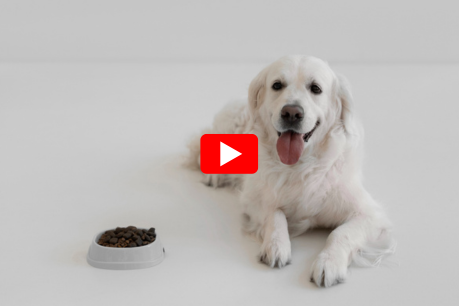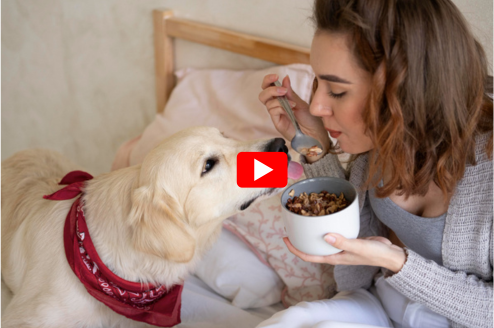Psyllium Husk for Dogs Dosage: Usage Guide & Tips
As responsible dog owners, ensuring our canine companions enjoy optimal health is always a priority. One natural dietary fiber that has gained recognition in recent years for its health benefits in both humans and pets is psyllium husk.
Derived from the seeds of the Plantago ovata plant, this soluble fiber can aid dogs in managing several digestive issues, from constipation to diarrhea and weight management.
The ideal psyllium husk dosage for dogs is 1/4 tsp per 10 lbs body weight daily, mixed with food or water, adjusting based on response and vet advice.
But how much psyllium husk is safe for dogs? Is there a standard dosage? In this comprehensive blog post, we’ll walk you through everything you need to know about psyllium husk for dogs dosage, how to administer it, when to use it, and important precautions to consider.
What is Psyllium Husk?
Psyllium husk is the outer shell of the seeds from the Plantago ovata plant, primarily grown in India. It’s a rich source of soluble fiber that absorbs water in the digestive tract, forming a gel-like substance that aids in regulating bowel movements.
In veterinary care, it’s often recommended for:
- Relieving dog constipation
- Managing diarrhea
- Supporting anal gland health
- Promoting weight control
- Assisting in certain colonic diseases
As a natural and generally well-tolerated fiber, psyllium husk can be a gentle, effective tool for improving your dog’s digestive health when used appropriately.
How Does Psyllium Husk Benefit Dogs?
Before we dive into precise dosage instructions, it’s helpful to understand why you might consider adding psyllium husk to your dog’s diet:
Supports Healthy Digestion
Psyllium husk absorbs water in the intestines, bulking up stools and stimulating peristalsis (the muscle contractions that move waste through the digestive tract). This makes it useful for both constipation and diarrhea.
Helps Manage Constipation
For dogs dealing with hard, dry stools or occasional constipation, psyllium husk adds moisture and bulk, making bowel movements easier and more regular.
Aids in Diarrhea Relief
Interestingly, psyllium’s ability to absorb excess water can also firm up loose stools, offering natural relief from mild, non-infectious diarrhea.
Promotes Anal Gland Health
Regular, firm stools help naturally express a dog’s anal glands, preventing impaction and discomfort.
Assists in Weight Management
As a soluble fiber, psyllium can increase satiety (feeling full) and reduce overeating tendencies in overweight dogs when included as part of a vet-approved weight management plan.
Psyllium Husk for Dogs Dosage: How Much is Safe?
Now to the essential question: how much psyllium husk should you give your dog?
General Dosage Guidelines
The typical psyllium husk dosage for dogs is based on weight. Here’s a safe starting point:
- Small Dogs (Up to 10 lbs): 1/4 teaspoon daily
- Medium Dogs (11–30 lbs): 1/2 teaspoon daily
- Large Dogs (31–60 lbs): 1 teaspoon daily
- Giant Breeds (Over 60 lbs): 1½ to 2 teaspoons daily
Important Notes on Administration
- Always start with the lower end of the dose range and gradually increase if needed.
- Mix psyllium husk into your dog’s wet food or water to prevent choking.
- Ensure your dog has access to plenty of fresh water, as psyllium absorbs significant amounts of liquid.
- Introduce psyllium gradually to avoid sudden digestive upsets.
Factors Affecting Psyllium Husk Dosage
Not all dogs respond the same way to dietary changes. Several factors can influence the appropriate amount of psyllium for your dog:
Weight
Larger dogs can typically tolerate and require more fiber than smaller breeds.
Age
Senior dogs with slower metabolism or specific health conditions may need adjusted dosages under veterinary supervision.
Health Conditions
Dogs with chronic gastrointestinal problems or other health concerns might require tailored dosing recommendations.
Purpose of Use
Whether you’re using psyllium for constipation, diarrhea, or weight management will determine the appropriate dosage and duration.
How to Give Psyllium Husk to Dogs
Step-by-Step Administration Guide:
- Measure the appropriate dose based on your dog’s weight.
- Mix with wet dog food, plain yogurt, broth, or water.
- Ensure your dog drinks enough fresh water throughout the day.
- Monitor your dog’s stool consistency and overall behavior.
- Adjust the dose if needed, with veterinary guidance.
When Should You Give Psyllium Husk to Your Dog?
You can administer psyllium husk in situations like:
- Occasional constipation or diarrhea
- When advised by a vet for anal gland issues
- During a weight loss plan (under veterinary supervision)
- As a preventive measure for dogs prone to irregular stools
Do not use psyllium husk continuously without veterinary guidance. It’s intended for short-term support or as part of a structured, supervised regimen.
Potential Side Effects of Psyllium Husk in Dogs
While generally safe, psyllium husk can cause side effects if misused or if the dog is sensitive to dietary changes.
Possible side effects include:
- Bloating or gas
- Temporary increase in constipation if water intake is inadequate
- Diarrhea if dosed too high
- Allergic reactions (rare)
Discontinue use and consult your veterinarian if any adverse symptoms occur.
Precautions Before Using Psyllium Husk for Dogs
- Consult a veterinarian before starting psyllium husk, especially if your dog has chronic health issues or is on medication.
- Avoid using psyllium if your dog has a known plant allergy.
- Introduce fiber gradually to prevent gastrointestinal upset.
- Monitor for signs of dehydration or discomfort.
- Never substitute psyllium for veterinary care in cases of severe, persistent, or unexplained gastrointestinal problems.
Can Puppies Take Psyllium Husk?
Generally, it’s not recommended to give psyllium husk to puppies without veterinary supervision. Young dogs have delicate digestive systems and may react unpredictably to fiber supplementation. If your puppy is experiencing digestive problems, consult a veterinarian for appropriate treatment.
Psyllium Husk for Dogs Dosage Chart
| Dog Weight | Dosage (Psyllium Husk) |
|---|---|
| Up to 10 lbs | 1/4 teaspoon daily |
| 11–30 lbs | 1/2 teaspoon daily |
| 31–60 lbs | 1 teaspoon daily |
| Over 60 lbs | 1½ to 2 teaspoons daily |
Note: Adjust based on individual response and veterinary guidance.
How Long Does It Take for Psyllium Husk to Work in Dogs?
Most dogs respond within 12–48 hours after taking psyllium husk, depending on the underlying issue.
For constipation, results may appear by the next bowel movement, while diarrhea typically improves within a day or two. Always monitor your dog’s reaction to the fiber and adjust dosage if necessary.
How Often Can You Give Psyllium Husk to Dogs?
Psyllium husk is typically safe for short-term use or occasional supplementation. For chronic issues, continuous use should only occur under veterinary direction to prevent dependency, electrolyte imbalance, or dehydration.
Natural Alternatives to Psyllium Husk for Dogs
If psyllium husk isn’t suitable for your dog or you’d like to explore other options, consider these natural fiber sources:
- Canned pumpkin (plain, unsweetened)
- Cooked sweet potato
- Green beans
- Brown rice
- Oatmeal (plain)
Like psyllium, these alternatives should also be introduced gradually with proper vet advice.
Conclusion
Psyllium husk is a versatile, natural fiber supplement that can support various digestive issues in dogs, from constipation and diarrhea to weight management and anal gland health. However, the key to safe and effective use lies in proper dosing.
The general dosage rule is 1/4 teaspoon per 10 lbs of body weight daily, adjusted as needed based on your dog’s response and vet recommendations. Always introduce it gradually and ensure your dog stays well-hydrated.
While psyllium husk can be a valuable tool in your dog’s health toolkit, it’s no substitute for professional veterinary care in managing serious or persistent digestive issues.
References Link
- Psyllium Husk and Fiber in Dog Diets
https://veterinarypartner.vin.com/default.aspx?pid=19239&id=4951463
- Managing Constipation in Dogs
https://vcahospitals.com/know-your-pet/constipation-in-dogs
- Dog Constipation Causes and Remedies
https://www.akc.org/expert-advice/health/dog-constipation/
- Psyllium and Digestive Health Study
https://pmc.ncbi.nlm.nih.gov/articles/PMC5808362/
.



